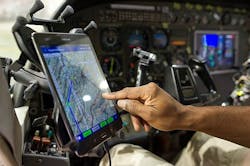Air Force avionics experts ask industry for SWaP-optimized artificial intelligence embedded computing
Officials of the Air Force Research Laboratory Information Directorate in Rome, N.Y., released a solicitation last Thursday (FA875019S7007) for the Robust And Efficient Computing Architectures, Algorithms, And Applications For Embedded Deep Learning project.
It seeks to achieve orders of magnitude improvement in SWaP for deployable artificial intelligence and machine learning embedded computing capabilities. Researchers are looking for greater sophistication, autonomy, intelligence, and assurance for command, control, communications, computers, intelligence, surveillance and reconnaissance (C4ISR) applications and SWaP-constrained aircraft.
Of particular interest are advanced computing architectures, algorithms, and applications. A major focus involves brain-inspired processing called neuromorphic computing.
Unconventional computing architectures are necessary for new capabilities in pattern recognition, event reasoning, decision making, adaptive learning, and autonomous tasking for energy-efficient agile Air Force platforms, researchers explain.
Neuromorphic computing involves processors beyond the Von Neumann architecture -- particularly unconventional circuits and architectures enabled by emerging nano-technology devices such as memristors and nano-photonics.
Researchers want to demonstrate modular computing for future Air Force real-time embedded plug-and-play capabilities. Technologies and applications may include artificial intelligence and machine learning for big data analytics of multi-source sensor data; data fusion algorithms for situation understanding and sense-making; and autonomous decision making techniques. Modular designs should support interchangeable sensors with automatic software reconfiguration.
Data bandwidth requirements of future systems are expected to increase significantly, researchers warn, so computers and interfaces should be able to scale accordingly.
In addition, researchers are interested in technologies that validate, verify, and improve the scalability, robustness, and security of artificial intelligence and machine learning -- particularly deep-learning models and algorithms. Research topics may include power-aware and energy-optimized deep learning for deployable embedded computing with dynamic data.
Companies interested have five chances to submit white papers over the next five years, beginning this month. Companies should submit white papers by 30 April 2019; 31 July 2019; 29 May 2020; 28 May 2021; and 27 May 2022.
Researchers plan to spend $30 million on this project in 2019; $30 million in 2020; $15 million in 2021; $15 million in 2022; and $9 million in 2023.
Companies should submit two copies of two-to-four-page white papers to the Air Force's Albert Frantz. Email unclassified white papers to [email protected], and submit classified white papers by post to Albert Franz care of AFRL/RITB, 525 Brooks Rd., Rome, NY 13441-4505.
For technical questions or concerns contact Albert Frantz by email at [email protected], or by phone at 315-330-4713. For contracting questions contact Amber Buckley at [email protected], or by phone at 315-330-3605.
More information is online at https://www.fbo.gov/spg/USAF/AFMC/AFRLRRS/FA875019S7007/listing.html.
Ready to make a purchase? Search the Military & Aerospace Electronics Buyer's Guide for companies, new products, press releases, and videos
